英语论文-中国古典诗词的美感在英译中的体现
中国古典诗词英语作文
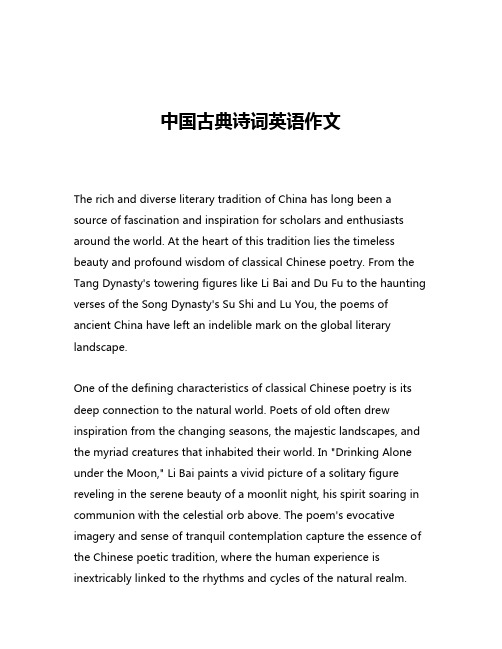
中国古典诗词英语作文The rich and diverse literary tradition of China has long been a source of fascination and inspiration for scholars and enthusiasts around the world. At the heart of this tradition lies the timeless beauty and profound wisdom of classical Chinese poetry. From the Tang Dynasty's towering figures like Li Bai and Du Fu to the haunting verses of the Song Dynasty's Su Shi and Lu You, the poems of ancient China have left an indelible mark on the global literary landscape.One of the defining characteristics of classical Chinese poetry is its deep connection to the natural world. Poets of old often drew inspiration from the changing seasons, the majestic landscapes, and the myriad creatures that inhabited their world. In "Drinking Alone under the Moon," Li Bai paints a vivid picture of a solitary figure reveling in the serene beauty of a moonlit night, his spirit soaring in communion with the celestial orb above. The poem's evocative imagery and sense of tranquil contemplation capture the essence of the Chinese poetic tradition, where the human experience is inextricably linked to the rhythms and cycles of the natural realm.Similarly, the poems of Du Fu, often hailed as the "Poet-Sage" of the Tang Dynasty, are renowned for their keen observation of the human condition and their ability to weave together the personal and the universal. In "Ballad of the Army Carts," Du Fu masterfully depicts the plight of common soldiers caught in the throes of war, their weary faces and heavy burdens conveying the profound human cost of conflict. Yet, even in the midst of such sorrow, the poet finds moments of beauty and resilience, as the soldiers' carts "creak and groan" through the desolate landscape, a testament to the enduring spirit of the human condition.The influence of Taoism and Confucianism is also deeply felt in the works of classical Chinese poets. In the contemplative verses of Tao Yuanming, we find a profound appreciation for the simple pleasures of life, a rejection of the material trappings of the world, and a yearning for a harmonious existence in tune with the natural order. His poem "Drinking Wine" captures this sentiment beautifully, as the poet revels in the joy of solitary contemplation, surrounded by the verdant mountains and the flowing streams that nourish his soul.The poets of the Song Dynasty, such as Su Shi and Lu You, continued to explore the intersection of the personal and the universal, often using their work as a means of social and political commentary. Su Shi's "Inscription on the Red Cliff" is a poignant reflection on thefleeting nature of human existence, as the poet contemplates the ruins of an ancient fortress and the ebb and flow of history. In the face of such impermanence, Su Shi finds solace in the enduring beauty of the natural world and the timeless wisdom of the sages who have come before him.The influence of classical Chinese poetry can be seen in the work of countless writers and thinkers across the globe. From the haiku of Japan to the ghazals of the Middle East, the echoes of this rich literary tradition can be heard in the verses of poets and the musings of philosophers. In the West, figures like Ezra Pound and Gary Snyder have drawn inspiration from the concision and evocative power of Chinese poetry, incorporating its techniques and sensibilities into their own innovative works.Moreover, the study of classical Chinese poetry has become an increasingly important aspect of the global academic landscape. Scholars from diverse backgrounds have dedicated themselves to translating, analyzing, and disseminating these timeless works, ensuring that the beauty and wisdom of the Chinese poetic tradition continue to resonate with audiences around the world.As we grapple with the challenges and complexities of the modern world, the enduring appeal of classical Chinese poetry lies in its ability to offer us a respite from the noise and turmoil of daily life. Inthe serene landscapes and profound meditations of these ancient verses, we find a wellspring of solace and inspiration, a reminder of the timeless truths that have sustained the human spirit for centuries. Whether we are seeking solace in the beauty of nature, solace in the contemplation of the human condition, or solace in the timeless wisdom of the sages, the poetry of ancient China continues to be a wellspring of insight and inspiration for all who seek to explore the depths of the human experience.。
中国古典诗词英语作文80词
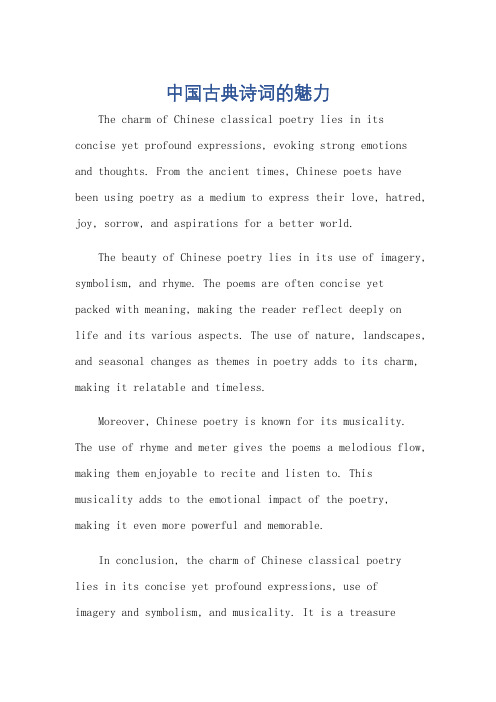
中国古典诗词的魅力The charm of Chinese classical poetry lies in its concise yet profound expressions, evoking strong emotions and thoughts. From the ancient times, Chinese poets have been using poetry as a medium to express their love, hatred, joy, sorrow, and aspirations for a better world.The beauty of Chinese poetry lies in its use of imagery, symbolism, and rhyme. The poems are often concise yet packed with meaning, making the reader reflect deeply onlife and its various aspects. The use of nature, landscapes, and seasonal changes as themes in poetry adds to its charm, making it relatable and timeless.Moreover, Chinese poetry is known for its musicality. The use of rhyme and meter gives the poems a melodious flow, making them enjoyable to recite and listen to. This musicality adds to the emotional impact of the poetry, making it even more powerful and memorable.In conclusion, the charm of Chinese classical poetrylies in its concise yet profound expressions, use ofimagery and symbolism, and musicality. It is a treasuretrove of wisdom and emotion that continues to inspire and captivate people across the globe.**中国古典诗词的魅力**中国古典诗词的魅力在于其简洁而深刻的表达,能够唤起强烈的情感和思考。
中国传统诗词翻译英语作文
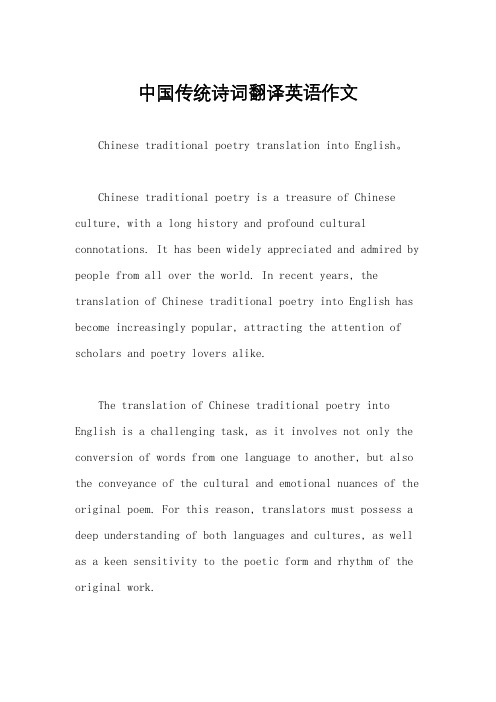
中国传统诗词翻译英语作文Chinese traditional poetry translation into English。
Chinese traditional poetry is a treasure of Chinese culture, with a long history and profound cultural connotations. It has been widely appreciated and admired by people from all over the world. In recent years, the translation of Chinese traditional poetry into English has become increasingly popular, attracting the attention of scholars and poetry lovers alike.The translation of Chinese traditional poetry into English is a challenging task, as it involves not only the conversion of words from one language to another, but also the conveyance of the cultural and emotional nuances of the original poem. For this reason, translators must possess a deep understanding of both languages and cultures, as well as a keen sensitivity to the poetic form and rhythm of the original work.One of the most famous examples of Chinese traditional poetry is the Tang Dynasty poem "Quiet Night Thoughts" by Li Bai. This poem, which describes the poet's feelings of homesickness and longing for his distant home, has been translated into English by numerous scholars and poets. Each translation reflects the unique style and interpretation of the translator, resulting in a wide range of English versions of the same poem.For example, one translation by the renowned poet Ezra Pound captures the essence of the original poem while infusing it with his own poetic sensibility. In his translation, Pound maintains the simplicity and elegance of Li Bai's language, while adding his own unique touch to the poem. Another translation by the scholar Witter Bynner focuses on the emotional depth and resonance of the poem, conveying the poet's longing and nostalgia in a more direct and heartfelt manner.In addition to these individual translations, there have been numerous scholarly studies and comparative analyses of different English translations of Chinesetraditional poetry. These studies have shed light on the complex and multifaceted nature of translation, and have deepened our understanding of the cultural and linguistic challenges involved in the process.The translation of Chinese traditional poetry into English not only serves as a bridge between different cultures, but also enriches the literary landscape of both languages. It allows readers from around the world to appreciate the beauty and wisdom of Chinese poetry, and provides a platform for cross-cultural dialogue and exchange.In conclusion, the translation of Chinese traditional poetry into English is a valuable and meaningful endeavor that requires both skill and sensitivity. It not only preserves the rich heritage of Chinese culture, but also contributes to the global appreciation and understanding of poetry as a universal language of human emotion and experience. As the world becomes increasingly interconnected, the translation of Chinese traditionalpoetry into English will continue to play an important role in promoting cultural exchange and mutual understanding.。
鉴赏中国诗歌的英文作文
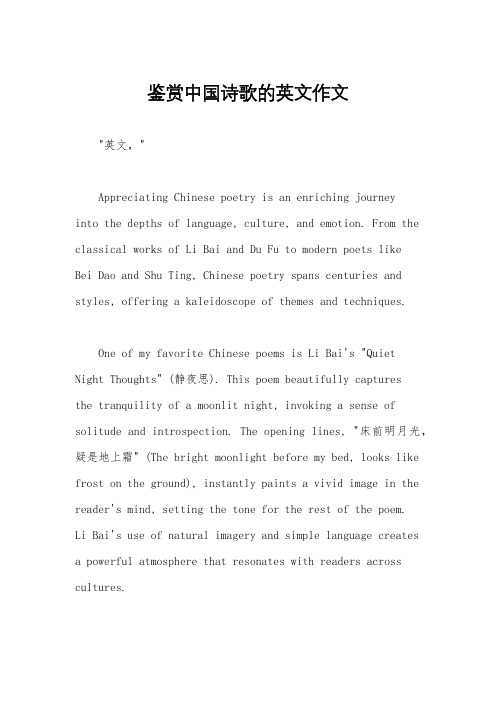
鉴赏中国诗歌的英文作文"英文,"Appreciating Chinese poetry is an enriching journeyinto the depths of language, culture, and emotion. From the classical works of Li Bai and Du Fu to modern poets likeBei Dao and Shu Ting, Chinese poetry spans centuries and styles, offering a kaleidoscope of themes and techniques.One of my favorite Chinese poems is Li Bai's "Quiet Night Thoughts" (静夜思). This poem beautifully capturesthe tranquility of a moonlit night, invoking a sense of solitude and introspection. The opening lines, "床前明月光,疑是地上霜" (The bright moonlight before my bed, looks like frost on the ground), instantly paints a vivid image in the reader's mind, setting the tone for the rest of the poem.Li Bai's use of natural imagery and simple language creates a powerful atmosphere that resonates with readers across cultures.Another remarkable aspect of Chinese poetry is its use of symbolism and metaphor. In Du Fu's poem "Spring Landscape" (春景), the arrival of spring is not merely a change in seasons but a metaphor for renewal and hope. Du Fu writes, "花随流水落,飞燕舞风还" (Flowers fall with the flowing water, swallows dance in the returning breeze), symbolizing the cyclical nature of life and the eternal rhythm of nature.Moreover, Chinese poetry often incorporates philosophical insights and cultural nuances. In Bai Juyi's "Song of Everlasting Sorrow" (长恨歌), the tragic love story of Emperor Xuanzong and his beloved concubine Yang Guifei reflects the ephemeral nature of power and the fleetingness of human existence. The poem's poignant portrayal of love and loss transcends time and speaks to the universal human experience.In conclusion, appreciating Chinese poetry offers a window into the soul of a nation and its people. Through its rich imagery, profound symbolism, and timeless themes, Chinese poetry continues to captivate and inspire readersaround the world."中文,"欣赏中国诗歌是一次丰富的语言、文化和情感之旅。
感受到唐诗的魅力英文作文
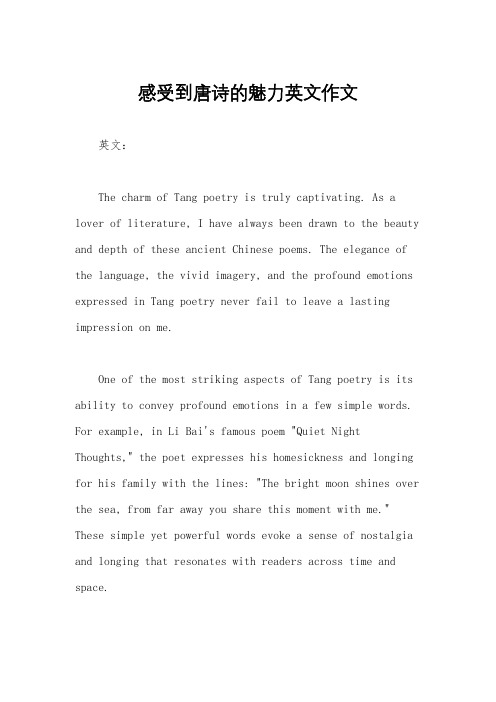
感受到唐诗的魅力英文作文英文:The charm of Tang poetry is truly captivating. As a lover of literature, I have always been drawn to the beauty and depth of these ancient Chinese poems. The elegance of the language, the vivid imagery, and the profound emotions expressed in Tang poetry never fail to leave a lasting impression on me.One of the most striking aspects of Tang poetry is its ability to convey profound emotions in a few simple words. For example, in Li Bai's famous poem "Quiet Night Thoughts," the poet expresses his homesickness and longing for his family with the lines: "The bright moon shines over the sea, from far away you share this moment with me." These simple yet powerful words evoke a sense of nostalgia and longing that resonates with readers across time and space.Moreover, Tang poetry often reflects the natural beauty of China, with its mountains, rivers, and changing seasons. For instance, in Du Fu's poem "Spring View," the poet vividly describes the arrival of spring and the beauty of nature with the lines: "The country is broken, though hills and rivers remain; in the city, spring trees are bright." This imagery not only captures the essence of spring but also conveys a sense of hope and renewal.In addition, the musicality of Tang poetry is another aspect that adds to its allure. The rhythmic flow of the lines and the use of rhymes create a melodic quality thatis both soothing and enchanting. For example, in Wang Wei's poem "Deer Park," the poet's use of repetition and rhythm creates a sense of tranquility and harmony that mirrors the peaceful scene he describes.Overall, the charm of Tang poetry lies in its ability to capture the essence of human emotions, the beauty of nature, and the musicality of language in a way that transcends time and culture. It is no wonder that these ancient poems continue to inspire and move readers aroundthe world.中文:唐诗的魅力真是令人着迷。
古典诗词女性美作文

古典诗词女性美作文
英文回答:
In classical Chinese poetry, the portrayal of female beauty is often depicted with delicate and graceful language, evoking images of ethereal charm and elegance.
The poets often use metaphors and allusions to describe the beauty of women, comparing them to flowers, moonlight, or even mythical beings. The use of vivid imagery and lyrical language creates a sense of romanticism and allure,
capturing the essence of female beauty in a timeless manner.
中文回答:
在古典中国诗歌中,对女性美的描绘常常用精致而优雅的语言,唤起了空灵的魅力和优雅的形象。
诗人们常常使用隐喻和典故来描
述女性的美丽,将她们比作花朵、月光,甚至是神话中的存在。
生
动的意象和抒情的语言营造了一种浪漫主义和诱惑力,捕捉了女性
美的本质,以一种永恒的方式。
从汉英两方面赏析英译古诗词
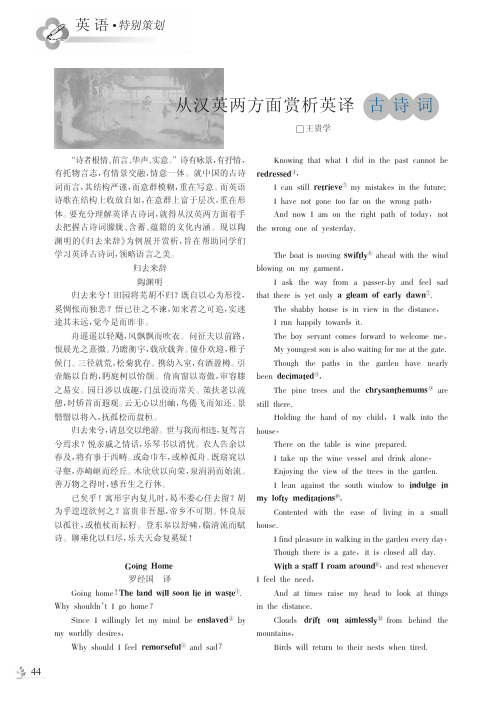
英语·“诗者根情、苗言、华声、实意。
”诗有咏景,有抒情,有托物言志,有情景交融,情意一体。
就中国的古诗词而言,其结构严谨,而意群模糊,重在写意。
而英语诗歌在结构上收放自如,在意群上富于层次,重在形体。
要充分理解英译古诗词,就得从汉英两方面着手去把握古诗词朦胧、含蓄、蕴籍的文化内涵。
现以陶渊明的《归去来辞》为例展开赏析,旨在帮助同学们学习英译古诗词,领略语言之美。
归去来辞陶渊明归去来兮!田园将芜胡不归?既自以心为形役,奚惆怅而独悲?悟已往之不谏,知来者之可追,实迷途其未远,觉今是而昨非。
舟遥遥以轻飏,风飘飘而吹衣。
问征夫以前路,恨晨光之熹微。
乃瞻衡宇,载欣载奔。
僮仆欢迎,稚子候门。
三径就荒,松菊犹存。
携幼入室,有酒盈樽。
引壶觞以自酌,眄庭柯以怡颜。
倚南窗以寄傲,审容膝之易安。
园日涉以成趣,门虽设而常关。
策扶老以流憩,时矫首而遐观。
云无心以出岫,鸟倦飞而知还。
景翳翳以将入,抚孤松而盘桓。
归去来兮,请息交以绝游。
世与我而相违,复驾言兮焉求?悦亲戚之情话,乐琴书以消忧。
农人告余以春及,将有事于西畴。
或命巾车,或棹孤舟。
既窈窕以寻壑,亦崎岖而经丘。
木欣欣以向荣,泉涓涓而始流。
善万物之得时,感吾生之行休。
已矣乎!寓形宇内复几时,曷不委心任去留?胡为乎遑遑欲何之?富贵非吾愿,帝乡不可期。
怀良辰以孤往,或植杖而耘籽。
登东皋以舒啸,临清流而赋诗。
聊乘化以归尽,乐夫天命复奚疑!Going Home%罗经国译Going home!The land will soon lie in waste①.Why shouldn’t I go home?Since I willingly let my mind be enslaved②bymy worldly desires,Why should I feel remorseful③and sadKnowing that what I did in the past cannot beredressed④,I can still retrieve⑤my mistakes in the future;I have not gone too far on the wrong path,And now I am on the right path of today,notthe wrong one of yesterday.The boat is moving swiftly⑥ahead with the windblowing on my garment,I ask the way from a passer-by and feel sadthat there is yet only a gleam of early dawn⑦.The shabby house is in view in the distance,I run happily towards it.The boy servant comes forward to welcome me,My youngest son is also waiting for me at the gate.Though the paths in the garden have nearlybeen decimated⑧,The pine trees and the chrysanthemums⑨arestill there.Holding the hand of my child,I walk into thehouse,There on the table is wine prepared.I take up the wine vessel and drink alone,Enjoying the view of the trees in the garden.I lean against the south window to indulge inmy lofty meditations⑩,Contented with the ease of living in a smallhouse.I find pleasure in walking in the garden every day,Though there is a gate,it is closed all day.With a staff I roam around輥輯訛,and rest wheneverI feel the need,And at times raise my head to look at thingsin the distance.Clouds drift out aimlessly輥輰訛from behind themountains,Birds will return to their nests when tired.从汉英两方面赏析英译□王贵学特别策划古诗词44英语·It grows dim as the sun sets ,I linger ,stroking the trunk of the solitarypine tree 輥輱訛.Going home !I will cut off all human relations.Since the world is at odds with 輥輲訛me ,What should I seek by driving out in a carriage I will have intimate talks with my kinsmen 輥輳訛,And forget my miseries by playing on the harp and reading books.Country folks 輥輴訛will come to tell me that springhas come ,And that farm work will begin in the western field.I would either ride on a cart ,or row a smallboat 輥輵訛,Sometimes following a clear and deep stream that leads me to a valley ,Sometimes walking along a rugged and bumpypath 輥輶訛that takes me over a hill.Trees are growing boisterously 輥輷訛,Spring water is flowing smoothly.I envy all things that enjoy the blessings of nature ,And feel miserable that my life will soon be over.Alas 輦輮訛!How many more days can I live on thisearth ?Why not take life as it isWhy do I worry What am I aspiring to 輦輯訛I do not seek wealth and position ,Nor do I desire to live with fairies and gods 輦輰訛.I would go out alone on a fine day ,To cultivate farmland with my staff laidaside 輦輱訛.I would shout aloud on the top of the eastern hill ,And compose poems by clear streams.Welcoming death as part of the vicissitudes 輦輲訛oflife ,I would be contented with what is willed by Heaven.What else do I want一、从汉语角度把握诗歌的原味《归去来辞》是东晋陶渊明的著名辞赋,作于作者辞官归田之初,是一篇述志的作品。
用英语写好中国诗词作文
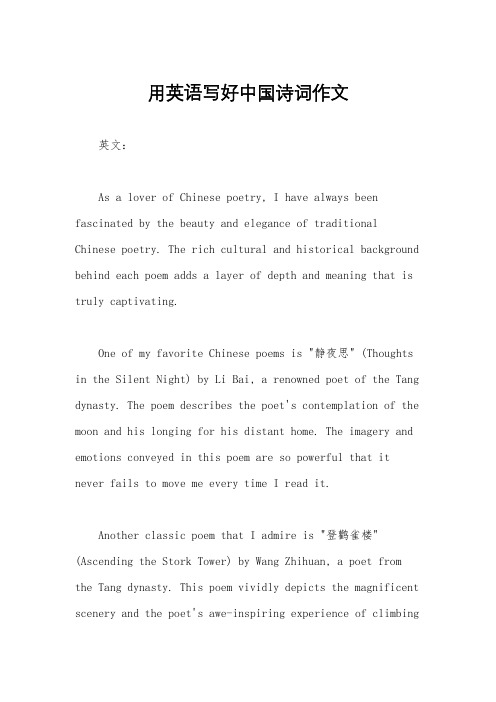
用英语写好中国诗词作文英文:As a lover of Chinese poetry, I have always been fascinated by the beauty and elegance of traditional Chinese poetry. The rich cultural and historical background behind each poem adds a layer of depth and meaning that is truly captivating.One of my favorite Chinese poems is "静夜思" (Thoughts in the Silent Night) by Li Bai, a renowned poet of the Tang dynasty. The poem describes the poet's contemplation of the moon and his longing for his distant home. The imagery and emotions conveyed in this poem are so powerful that it never fails to move me every time I read it.Another classic poem that I admire is "登鹳雀楼" (Ascending the Stork Tower) by Wang Zhihuan, a poet from the Tang dynasty. This poem vividly depicts the magnificent scenery and the poet's awe-inspiring experience of climbingthe stork tower. The use of vivid imagery and the poet's emotional response to the beauty of nature make this poem truly unforgettable.Chinese poetry is not only about the words and the meanings behind them, but also about the rhythm and musicality of the language. The use of tonal patterns and the skillful arrangement of characters create a unique poetic form that is both challenging and rewarding to appreciate.In addition to the linguistic aspects, Chinese poetry also often reflects the philosophical and spiritual beliefs of the poets. For example, the concept of "禅" (Zen) is frequently explored in Chinese poetry, with poets expressing their deep contemplation and understanding of the nature of existence and the universe.中文:作为一个热爱中国诗词的人,我一直被传统中国诗歌的优美和典雅所吸引。
- 1、下载文档前请自行甄别文档内容的完整性,平台不提供额外的编辑、内容补充、找答案等附加服务。
- 2、"仅部分预览"的文档,不可在线预览部分如存在完整性等问题,可反馈申请退款(可完整预览的文档不适用该条件!)。
- 3、如文档侵犯您的权益,请联系客服反馈,我们会尽快为您处理(人工客服工作时间:9:00-18:30)。
中国古典诗词的美感在英译中的体现中文摘要中国古典诗词的创作是一门艺术,是意境美、音韵美和形式美的和谐统一。
这些美感在其英译中不但不能丧失,而且还要尽量体现。
翻译难,译文学作品尤难,译诗更是难上加难。
对中国古典诗词的英译,尤其是在再现原文“三美”这方面,其困境早已是译界的共识,尽管如此,译界依然不乏具有研究价值的古典诗词英译的上乘作品。
本文就精选一些出自大家手笔的中国古典诗词的译作,并联系一些理论,从多个角度分析原作的意美、音美、形美是如何在其英译中体现的,并结合自己的启迪,将北朝民歌《木兰辞》在原译者的基础上改译,以求进一步体现原作的美感。
关键词:中国古典诗词;美感;英译;体现AbstractThe production of Chinese classic poetry is a kind of art, which contains the beauty of artistic conception, temperament and form. When the Chinese classic poetry is translated into English, the beauty of the poetry is not only to be reserved, but also to be embodied. In terms of the English translation of Chinese classic poetry, the reappearance of the “three beauties” is especially a difficult work, and there are, however, still a lot of valuable English versions of Chinese classic poetry. This paper displays some excellent English versions of Chinese classic poetry by famous translators, and expounds how the “three beauties” are embodied in English translation through deep analysis. And this paper also contains a revised English translation of the classic poem “Mu Lan Ci” to further reappear the beauty.Key words: Chinese classic poetry; beauty; English translation; reappearance一、引言诗歌美学认为,诗歌美是由三维组成的复合艺术系统,三维是指意象美、音乐美、绘画美[1](P65)。
中国古典诗词更是如此,它形象生动,音调和谐,节奏鲜明,含蓄婉约,耐人寻味,是中华民族文学艺术宝库的精品。
而在中国古典诗词的英译方面,林语堂先生在《论翻译》一文中,除了提出翻译的忠实标准和通顺标准外,还着重强调了美的标准。
他认为翻译家应当将翻译视为一种艺术,必须兼顾到美感这一方面。
笔者十分认同林先生的观点,因为诗的首要条件就是美感。
所谓“美感”,就是原文所体现的意境之美、音韵之美和形式之美。
也就是许渊冲先生所说的诗词“三美”——意美、音美、形美[2](P68)。
而从文艺美学和诗美艺术的角度来看,诗词翻译就是原文审美特质和艺术魅力的再现。
本文分别从意美、音美和形美三方面分析和阐述中国古典诗词的美感如何在英译中体现。
二、“三美”在英译中的体现(一)、意美:内容的再现何谓“意美”?对于诗歌之意,中国古典文论中有精辟论述:“诗有内外意,内意欲尽其理,外意欲尽其象。
” [3](P77)诗词翻译中“意美”的内涵,不仅仅局限于“意义美”,而且还包括了“意象美”。
中国古典诗词,以含蓄微妙见长,十分讲求形象思维。
诗人在审美创作过程中,往往会呈现给读者一种表达其强烈思想情感和审美情趣的物象,于是主观情感与客观物象便融合成了一种“意象”。
这种意象往往体现在唯一的一个炼字上,可谓“画龙点睛”。
翻译诗词同样也要对字词加以锤炼和推敲,若能在译文中选用精炼贴切的词,原文的意境便能生动地体现,传神地表达。
1、意象美的再现诗词的意象是情景交融而产生的。
对于意象美的再现,李白《菩萨蛮》的译文是个好例子,这首词头两句:原文:平林漠漠烟如织,寒山一带伤心碧。
译文:A flat-top forest stretches far in embroidered mist,A cluster of mountains cool is tinged with heartbreak blue[4](P78).这是一首怀人词,写思妇盼望远方行人久去而不归的心情。
这两句为远景,此处“漠漠”没有直接译出,但句中三个“f”起头的词(flat,forest,far)把“漠漠”表示出来了。
[f]是唇齿音,可以拖得很长,将树林“无边无垠”的感觉体现出来了;第二句“伤心碧”的“碧”字,译者用英美传统诗中的相关意象来替换这一色彩意象,将“碧”译成“blue”,巧妙运用了blue一词多义的特点,既表达了山色碧,又传达了思妇的“忧郁”这一深层含义,一语双关,充分表现了李白用语奇特的特点。
其实“blue”这个意象和“碧”在颜色上的意思并不完全一致,一个“蓝”,一个“绿”,但微妙之处在于译者根据英语语言的特点,选用了同“碧”这个意象艺术效果十分相近的意象“blue”。
这就是翻译补偿法中的“功能替代法[5](P75)”。
同时用“heartbreak blue”来译“伤心碧”,不仅忠于原文,而且在用语上达到了双重强调的目的,符合英美读者的欣赏习惯;第二句可分两段:A cluster of mountains cool is tinged with heartbreak blue(寒山一带伤心碧),这里运用“变序法[6](P75)”,将cool mountains调个头,变成mountains cool,是为使它同句尾blue相呼应:[u:]这个长元音在英语中常出现在表示“阴沉”、“阴郁”的词中,如gloom,doom,loom,brood等等。
这是通过读音加强了诗人所要表达的“忧伤感”。
如此两行译文一出,原词中行人之远与思妇伫望之深,尽在言中。
有时古典诗词的意象是包含在一个很抽象的词语里,在英译时却可以用一个生动、形象的词汇加以表达,不仅能增强诗词语言的感染力,所达到的艺术效果甚至会比原文更加传神。
如林语堂先生所译的杜甫《石壕吏》中的两句:老妪力虽衰,Although my strength is ebbing weak and low,请从吏夜归。
I’ll go with you, bailiff, to the front to serve [7](P52).且不说此译文是否在形式上忠实于原文,关键是它传神的地方在于“ebbing”一词。
“ebb”的原意为“退潮”,此处运用了进行时态,比喻老妇人精力日渐衰退,不但形象贴切,而且译活了原诗,引人联想,原文内容顿时变得饱满。
此译法就是许冲渊先生所说的“深化译法”。
与此类似的译法也体现在林语堂先生的又一译作中,他将苏轼的诗句“独骑瘦马踏残月”中的“残月”,译为“declining moonlight[8](P53)”,将原诗的一个画面“化静为动”,赋予了原诗以生命力,产生了一种动态美,给人以更多的联想空间和更美的感受。
2、意义美的再现当原文没有一个特定的意象时,英译可以从整体出发,或直译或意译,目的是译出原文所要表达的思想主旨或作者的精神情感。
如陆游的一首《鹧鹕天》最后两句:“逢人问道归何处,笑指船儿此是家。
”这里用的是极普通的日常用字,译文也是非常口语化,几乎没有一个难字:“People ask me:where are you heading back to?Laughing,I point to the boat and say:This is home. [9](P81)”用朴质无华的语言写出了诗人浪迹江湖到处为家的人生态度。
(二)、音美:音韵的处理诗歌是具有音乐性的语言,音乐作品的最大特点之一是音符有节奏的流动。
中国古典诗词非常注重音韵节律之美,正如黑格尔曾说:“诗则绝对要有音节或韵,因为音节或韵是诗的原始的唯一的愉悦感官的芬芳气息,甚至比所谓富于意象的词藻还重要” [10](P22)。
鉴于这一点,在诗词的英译中也绝不可忽视对音韵的处理。
1、押韵的处理在音美方面,古典诗词中的乐感很多情况下是通过押韵来流露的。
尽管当前在诗词翻译界也有新诗体派,即散体派,但其诗行长短、顿数多少,都没有规范,韵式也不受原诗制约,因而很多译者还是主张以押韵来实现诗歌的音韵美。
笔者经过研究,认为原文的押韵在译文中是完全可以再现的。
如白居易的《长相思》:长相思Long Longing汴水流,Waters of Bian flow,泗水流,Waters of Si flow,流到瓜洲古渡头,Flow to the old ferry of Guachow,吴山点点愁。
The hills in Wu bow in sorrow.思悠悠,My longing seems to grow,恨悠悠,My grieving seems to grow,恨到归时方始休,Grow until comes back my yokefellow,月明人倚楼。
We lean on the rail in moonglow[11](P44).笔者十分赞赏这种高度忠实于原文的译文。
不仅译文的长短句与原文的长短句相呼应,译文中的顶真与原文中的顶真相呼应[12](P33),而且译文和原文都是从头句押韵到尾句,且都是押同一个韵[ou],甚至译文和原文的韵脚发音还是几乎相同的,就连题目的译文“Long Longing”也巧妙运用英语中两个形近的词汇,即贴切又雅致,译得颇具艺术感。
达到如此高度的一致在古典诗词的英译中实属难得。
全篇通读,一气呵成,自然流畅,词中少妇思随流水,身在妆楼,念远人而不得见,思无穷,恨亦无穷的情感随之体现得淋漓尽致。
笔者认为这是一篇很有欣赏价值的全面体现原诗“三美”的译文。
在押韵的处理上,南北朝民歌《子夜歌》的译文也是值得欣赏和评论的,其原文和译文如下:路涩无人行,The roads are muddy and forsaken,冒寒往相觅。
Despite and cold I came to thee.若不信侬时,Go and look at the footprints in snow,但看雪上迹。
